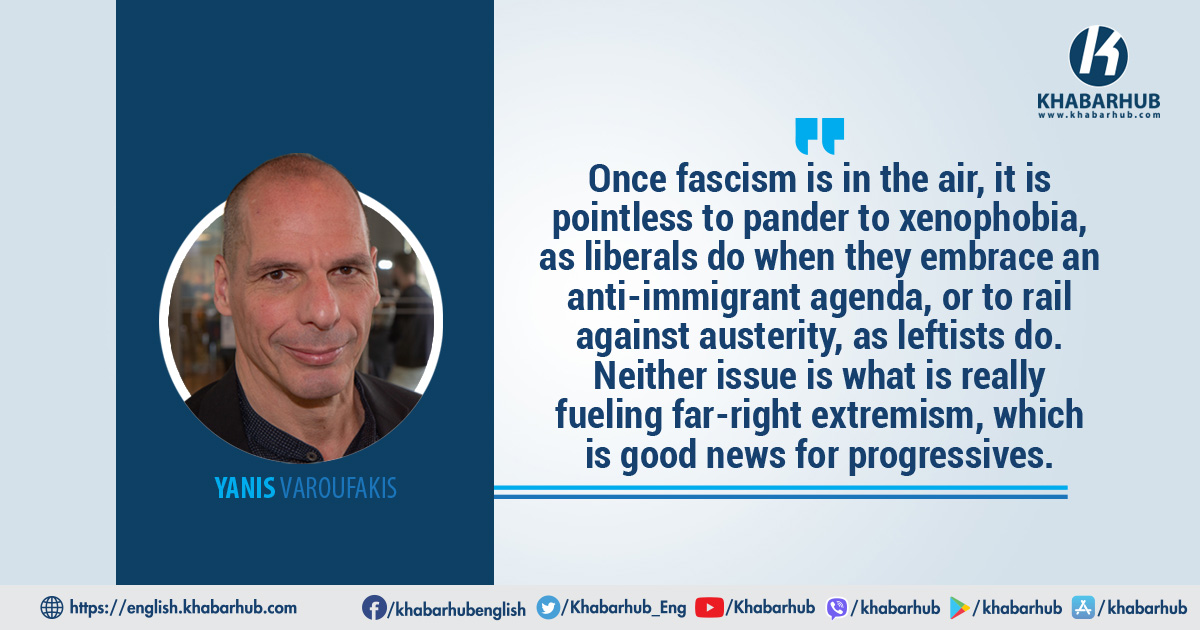The recent riots in the United Kingdom have demonstrated, yet again, the inability of liberals and leftists to figure out how to appeal to working class people who are attracted by the far right.
Once fascism is in the air, it is pointless to pander to xenophobia, as liberals do when they embrace an anti-immigrant agenda, or to rail against austerity, as leftists do.
To deal with Britain’s rioters, and similar mobs across Europe and the United States, progressives must first commit to not abandoning them.
My shocking introduction to the fascist mindset happened three decades ago, when Kapnias, an aging Greek peasant, decided to educate me.
His twisted insights, though revolting, still hold clues for places like northern England, eastern Germany, and America’s Midwest.
Kapnias had grown up dirt poor, a semi-bonded farmhand in a Peloponnesian village dominated by his landowner boss – a liberal patriarch who, during the Nazi occupation, was a British intelligence asset, his house functioning as a hub of the resistance.
Austerity has no face, unlike Jews or Muslim asylum seekers. And fascism needs faces as focal points of the violent hatred that drives it.
Watching British officers who had parachuted in enter the farmhouse, sometimes accompanied by bearded communist partisans, Kapnias knew that something was afoot – something he was unceremoniously excluded from.
“I was an untouchable,” Kapnias told me. “Until my white angel touched me,” he added, while proudly placing in my hand a leather-bound volume in an advanced state of disrepair: a 1934 edition of Mein Kampf that his Gestapo instructor, his “white angel,” had given him as a parting gift during the final stages of the occupation.
Savoring my revulsion, he proceeded to explain his hatred for the Allies.
“Their arrogance, their self-importance, their hubris led myriads to their death,” he said. Even before enlisting in a unit of collaborators, where he encountered his white angel, hatred drove him.
Sure, had Kapnias been better off, he might not have succumbed to the lure of Nazism.
But poverty does not explain why he collaborated when most boys from his village, no less disadvantaged, joined the Resistance.
When marginalization combines with deprivation, a certain type of person falls headlong into a moral void.
Like Kapnias, they become susceptible to the perverse logic of a super race whose time has come.
When I raised the Nazi massacres of his own people, Kapnias would have none of it.
For him, it was the British, his Greek boss, and the leftists who brought carnage to the land – a word I did not hear being used with such gusto again until Donald Trump deployed it in his inaugural address in 2017.
When I pushed him to comment further on the Nazi murders of hundreds in a nearby town, it was his cue elatedly to proclaim:
“Real men eliminate those who stand in their way, and thus survive. And if they die, through their death they accept their unfitness to live. My white angels were above God.
Unlike the Italians, the British, or our own mob, they did not hesitate to use any means.
No wincing! No fear! No passion! No love! No hatred! You had to see them with your own eyes. They were magnificent!”
As he spoke, his face lit up, my pained reaction to every word filling his heart with pleasure.
The British flashmobs who rioted against immigrants, supporters of Germany’s Alternative für Deutschland, and the resurgent American white supremacists may not be as vocal or articulate in their fascism, but they come from the same psychic place, and we can draw four lessons from their example.
First, fascist violence is a recruitment tool. Its chief purpose is to outrage us so that we denounce them and demand violent police action and long prison sentences.
The Old Oak’s moral clarity, and its testament to the power of solidarity, is as good a contemporary guide as any on how to stop victims from turning against each other.
That is how they gain recruits who, Kapnias-like, delight in watching their anger infect us.
Second, fascists are not community defenders or builders. They talk a good game about ruined communities but the closest they get to community-building is riots and social-media threads that evoke, but never satisfy, people’s hunger for community.
Third, while fascism breeds on a bed of austerity, fascists will never rail against austerity.
Austerity has no face, unlike Jews or Muslim asylum seekers. And fascism needs faces as focal points of the violent hatred that drives it.
Fourth, immigrants are irrelevant. As Kapnias taught me, fascists happily embrace foreigners as their white angels, including those, like Elon Musk or Donald Trump, who boast the kind of exorbitant wealth that they claim to decry.
Even if there are no brown faces or newcomers around, fascists will conjure some Other to focus their hatred on.
These four lessons suggest what we must avoid. For starters, when governments and mainstream parties adopt an anti-immigration “lite” agenda, fascists smell blood in the water, and their appetite for cruelty explodes.
Similarly, those who treat fascists like victims of austerity, poor education, or bad luck only make them angrier.
Telling them that anti-Semitism or Islamophobia are the fool’s anti-capitalism (though correct) works no better.
So, what must we do? The answer, I suggest, also comes from Britain, in the form of Ken Loach’s most recent film The Old Oak, written by Paul Laverty.
When a group of Syrian refugees is deposited in the midst of a ruined northern English town, a publican and a refugee succeed in defusing the clash between the new arrivals and the wretched locals whom deindustrialization and austerity made susceptible to the fascist mindset.
Under the slogan “eating together, sticking together,” they set up a communal dining hall where no fascist trope is tolerated, but no one is harangued, demeaned, or attacked, either.
The Old Oak’s moral clarity, and its testament to the power of solidarity, is as good a contemporary guide as any on how to stop victims from turning against each other.
Its message is universal: there is nothing inevitable about resurgent fascism.
(Yanis Varoufakis, a former finance minister of Greece, is leader of the MERA25 party and Professor of Economics at the University of Athens)
Copyright: Project Syndicate









Comment